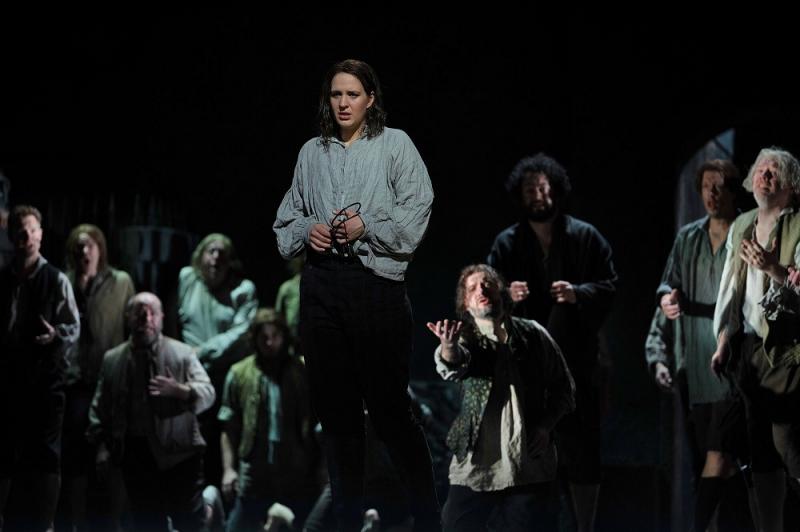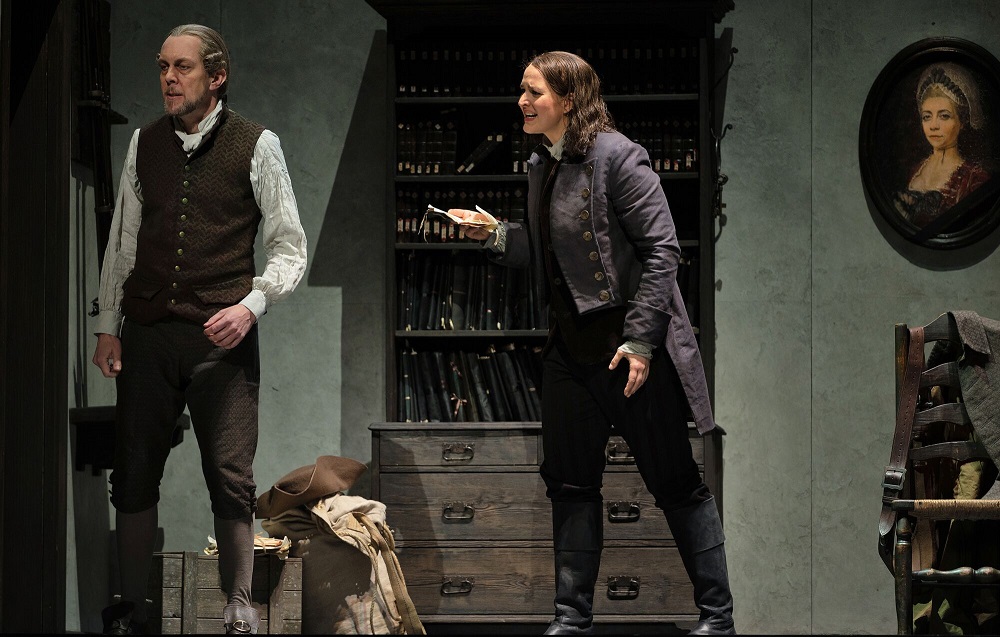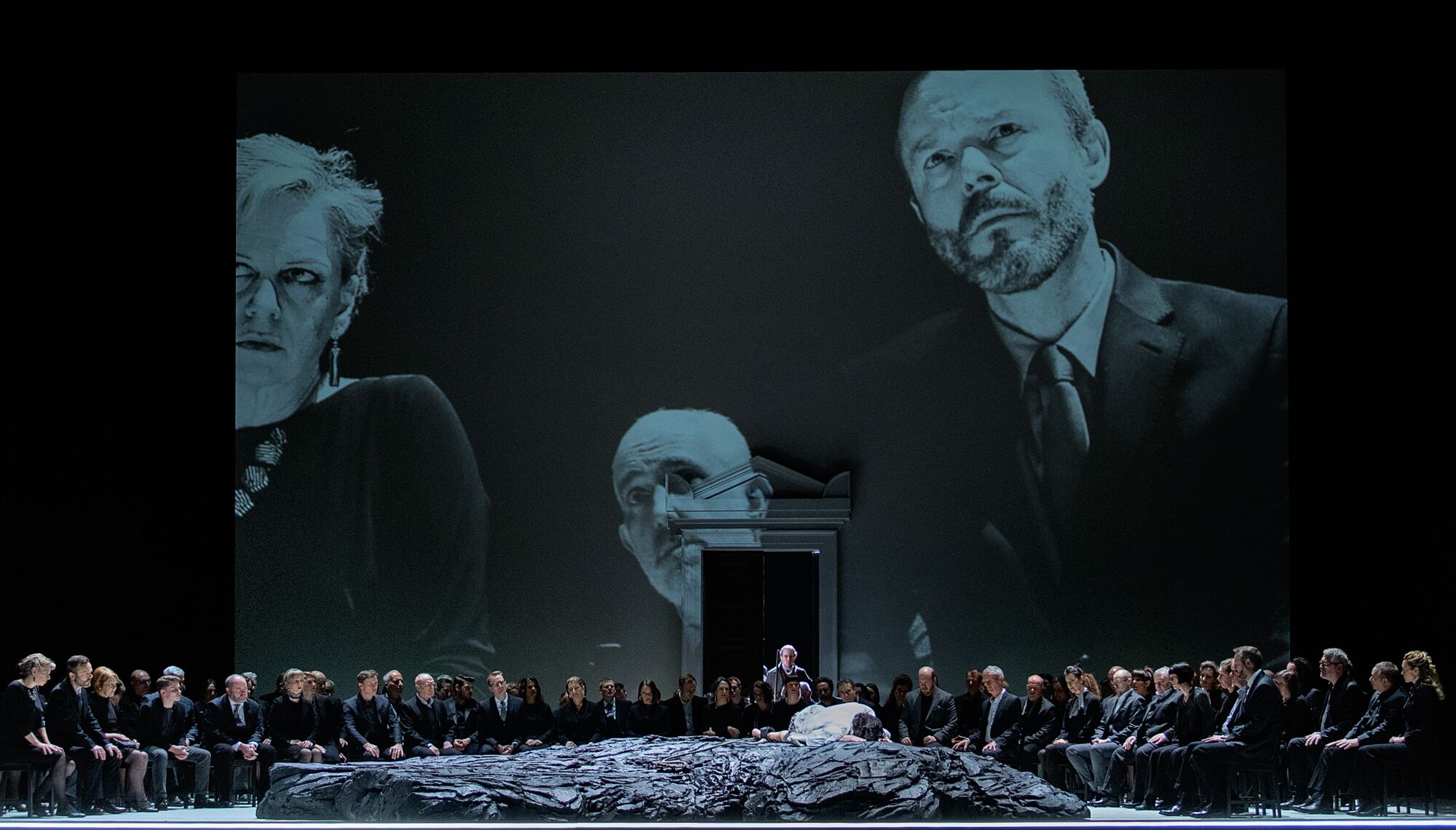Fidelio, Royal Opera review - fitfully vivid singing in a dramatic void | reviews, news & interviews
Fidelio, Royal Opera review - fitfully vivid singing in a dramatic void
Fidelio, Royal Opera review - fitfully vivid singing in a dramatic void
Davidsen and Kaufmann don't disappoint, but Beethoven's music-theatre goes for nothing

Emblazoned on a drop-curtain in front of a mirror-image of the auditorium, the three great tenets of the French revolution seem to be mocking us right at the start, above all the second of them: equality, really, given the make-up of the Royal Opera stalls?
The premise isn't a bad one: start at the end of the 18th century, with a supposedly realistic panorama of life in a French prison run by revolutionary forces – Beethoven's move to Spain was, after all, a matter of evading the censors - and surround the characters in Act Two with a contemporary ring of spectators (the chorus, as us – scene pictured below). Designer Rainer Sellmaier's mobile mix of dark prison yard and jailer Rocco's rooms couldn't be faulted, while no-one would object to the outwardly glaring lighting from Michael Bauer when the imprisoned Florestan's darkness is the hell within. Dramaturg Bettina Bartz explains all this admirably in the programme, with just a few loopholes (Beethoven is, after all, still following the rescue plot when she tells us he has opened up from drama to oratorio). Alas, Kratzer botches every possible correspondence between music and drama.  The misalliances start with business accompanying the overture to the revised and final opera of 1814, as opposed to Leonore Overtures 1, 2 or 3 (I hope we're going to get the radically different 1805 original before Beethoven anniversary year is out). This one is a mostly blithe dynamic journey to a significant rhythm, so a basket of heads dished out to newly-widowed women doesn't correspond. There is little clarity in the relations between Leonore disguised as "Fidelio", jailer's daughter Marzelline in love with "him" – Amanda Forsythe's light soprano can't carry the weight of character Kratzer wants to give her, though Elizabeth Watts, who played the role in the last Royal Opera staging might have managed it – Marzelline's suitor Jaquino, supposed I think to be a bit of a brute, but Robin Tritschler is way too nice, and Rocco himself, a role that has surprisingly little impact here despite the keen bass of Georg Zeppenfeld (pictured below with Davidsen).
The misalliances start with business accompanying the overture to the revised and final opera of 1814, as opposed to Leonore Overtures 1, 2 or 3 (I hope we're going to get the radically different 1805 original before Beethoven anniversary year is out). This one is a mostly blithe dynamic journey to a significant rhythm, so a basket of heads dished out to newly-widowed women doesn't correspond. There is little clarity in the relations between Leonore disguised as "Fidelio", jailer's daughter Marzelline in love with "him" – Amanda Forsythe's light soprano can't carry the weight of character Kratzer wants to give her, though Elizabeth Watts, who played the role in the last Royal Opera staging might have managed it – Marzelline's suitor Jaquino, supposed I think to be a bit of a brute, but Robin Tritschler is way too nice, and Rocco himself, a role that has surprisingly little impact here despite the keen bass of Georg Zeppenfeld (pictured below with Davidsen).
If you're going for realism at first, stick to it. Would a 1790s Marzelline, however traumatised, strip off in the room next door from her dad and attempt to unbutton her intended's trousers? Why try and convey military governer PIzarro's furious vengeful nature by having him take Marzelline's canary out of a cage, stroke it and throttle it – fine when the Beadle does it in the melodrama of Sondheim's Sweeney Todd, random here? Something was, in any case, wrong with Simon Neal, pitchy with Pizarro's top notes, never suggesting the uncontrollable rage. Was Pappano keeping down the orchestra to try and help him? The beautiful horse on which he entered riveted all eyes, but, as the epitome of calm grace, the polar opposite of what the scene demands. The tension never rose here, after a promising start with plenty of deft orchestral colour for Beethoven's least successful music in the early stages, where he tries to be Mozart and fails.  Dialogue is always a problem, but especially so when delivered with low energy and eked out by Kratzer with extra lines. We never begin to be involved in the story; even when Davidsen, after another pitchy start in the tricky Canon, and a bit of behind-the beat heaviness in the slow section of the magnificent aria, hit her stride with unavoidable shades of Birgit Nilsson in the middle range and a warm top register, the whole was and at every performance will be undermined by her unstrapping and being caught in the act by Marzelline. The choral prisoners sing beautifully, but where's the real context – do we perceive the release from darkness that's in the music?
Dialogue is always a problem, but especially so when delivered with low energy and eked out by Kratzer with extra lines. We never begin to be involved in the story; even when Davidsen, after another pitchy start in the tricky Canon, and a bit of behind-the beat heaviness in the slow section of the magnificent aria, hit her stride with unavoidable shades of Birgit Nilsson in the middle range and a warm top register, the whole was and at every performance will be undermined by her unstrapping and being caught in the act by Marzelline. The choral prisoners sing beautifully, but where's the real context – do we perceive the release from darkness that's in the music?
So – great set, lovely horse, young soprano living up to expectations, zero drama. Would the stricken vocal entry of Kaufmann's Florestan, presented as a circus animal inspected by today's bourgeoisie (shades of the dining-room scene in Ruben Östlund's unsettling satirical film The Square), fulfil the new energy of the orchestral introduction to Act Two? We were told to cut him some slack; he'd missed the final rehearsal and was still "under the weather". He never sounded it, and even carried off the insane high-register vision of Leonore as angel at the end of the aria, as very few tenors do. But there was to be precious little sense of who Florestan is or was, or much interaction with the wife who's dared everything to come and save him. When we should have been focusing on the trio with Rocco, large video projections of chorus members as audience looking artificially stricken or producing a bar of chocolate and eating it (as the lady on the left, pictured below, had seemingly been wanting to do all along) achieved – what exactly, Brechtian alienation? And how do you mess up the dramatic moment when Leonore pulls a pistol (actually nothing here) on Pizarro, declaring "first kill his wife"? Kratzer flunked that too. Davidsen was vocally magnificent, but had no directorial help at this crucial point, and dramatic plausibility was further stretched by more unstrapping. Guess what - it's Marzelline who shoots at Pizarro before spouting Grillparzer. Calixto Bieito's English National Opera Fidelio hampered its singers with an impossible-to-negotiate set but had many of us in tears when reunited husband and wife share a moment of calm as a string quartet descends in cages playing parts of Beethoven's Op. 132 "Song of Thanksgiving". Pure interpolation, but absolute theatrical magic. Nothing of the sort here, only the onlookers overcoming the guards of two centuries earlier and welcoming the ennobled couple into their circle. Jaquino left behind? Did anyone care? Not I. It's hard to say you have ever sat through Fidelio completely dry-eyed, but there's always a first time, and, for me at any rate, this was it.
Davidsen was vocally magnificent, but had no directorial help at this crucial point, and dramatic plausibility was further stretched by more unstrapping. Guess what - it's Marzelline who shoots at Pizarro before spouting Grillparzer. Calixto Bieito's English National Opera Fidelio hampered its singers with an impossible-to-negotiate set but had many of us in tears when reunited husband and wife share a moment of calm as a string quartet descends in cages playing parts of Beethoven's Op. 132 "Song of Thanksgiving". Pure interpolation, but absolute theatrical magic. Nothing of the sort here, only the onlookers overcoming the guards of two centuries earlier and welcoming the ennobled couple into their circle. Jaquino left behind? Did anyone care? Not I. It's hard to say you have ever sat through Fidelio completely dry-eyed, but there's always a first time, and, for me at any rate, this was it.
- theartsdesk's Bill Knight photographed the final (public) rehearsal, for which Kaufmann was indisposed, and the Marzelline made up in a way that yielded a request to remove her from the images
- Fidelio at the Royal Opera until 17 March, with livescreening of the final performance
- More opera reviews on theartsdesk
rating
Explore topics
Share this article
The future of Arts Journalism
You can stop theartsdesk.com closing!
We urgently need financing to survive. Our fundraising drive has thus far raised £49,000 but we need to reach £100,000 or we will be forced to close. Please contribute here: https://gofund.me/c3f6033d
And if you can forward this information to anyone who might assist, we’d be grateful.

Subscribe to theartsdesk.com
Thank you for continuing to read our work on theartsdesk.com. For unlimited access to every article in its entirety, including our archive of more than 15,000 pieces, we're asking for £5 per month or £40 per year. We feel it's a very good deal, and hope you do too.
To take a subscription now simply click here.
And if you're looking for that extra gift for a friend or family member, why not treat them to a theartsdesk.com gift subscription?
more Opera
 Tosca, Welsh National Opera review - a great company reduced to brilliance
The old warhorse made special by the basics
Tosca, Welsh National Opera review - a great company reduced to brilliance
The old warhorse made special by the basics
 BBC Proms: The Marriage of Figaro, Glyndebourne Festival review - merriment and menace
Strong Proms transfer for a robust and affecting show
BBC Proms: The Marriage of Figaro, Glyndebourne Festival review - merriment and menace
Strong Proms transfer for a robust and affecting show
 BBC Proms: Suor Angelica, LSO, Pappano review - earthly passion, heavenly grief
A Sister to remember blesses Puccini's convent tragedy
BBC Proms: Suor Angelica, LSO, Pappano review - earthly passion, heavenly grief
A Sister to remember blesses Puccini's convent tragedy
 Orpheus and Eurydice, Opera Queensland/SCO, Edinburgh International Festival 2025 review - dazzling, but distracting
Eye-popping acrobatics don’t always assist in Gluck’s quest for operatic truth
Orpheus and Eurydice, Opera Queensland/SCO, Edinburgh International Festival 2025 review - dazzling, but distracting
Eye-popping acrobatics don’t always assist in Gluck’s quest for operatic truth
 MARS, Irish National Opera review - silly space oddity with fun stretches
Cast, orchestra and production give Jennifer Walshe’s bold collage their all
MARS, Irish National Opera review - silly space oddity with fun stretches
Cast, orchestra and production give Jennifer Walshe’s bold collage their all
 Káťa Kabanová, Glyndebourne review - emotional concentration in a salle modulable
Janáček superbly done through or in spite of the symbolism
Káťa Kabanová, Glyndebourne review - emotional concentration in a salle modulable
Janáček superbly done through or in spite of the symbolism
 Buxton International Festival 2025 review - a lavish offering of smaller-scale work
Allison Cook stands out in a fascinating integrated double bill of Bernstein and Poulenc
Buxton International Festival 2025 review - a lavish offering of smaller-scale work
Allison Cook stands out in a fascinating integrated double bill of Bernstein and Poulenc
 Tosca, Clonter Opera review - beauty and integrity in miniature
Happy surprises and a convincing interpretation of Puccini for today
Tosca, Clonter Opera review - beauty and integrity in miniature
Happy surprises and a convincing interpretation of Puccini for today
 Hamlet, Buxton International Festival review - how to re-imagine re-imagined Shakespeare
Music comes first in very 19th century, very Romantic, very French operatic creation
Hamlet, Buxton International Festival review - how to re-imagine re-imagined Shakespeare
Music comes first in very 19th century, very Romantic, very French operatic creation
 Falstaff, Glyndebourne review - knockabout and nostalgia in postwar Windsor
A fat knight to remember, and snappy stagecraft, overcome some tedious waits
Falstaff, Glyndebourne review - knockabout and nostalgia in postwar Windsor
A fat knight to remember, and snappy stagecraft, overcome some tedious waits
 Salome, LSO, Pappano, Barbican review - a partnership in a million
Asmik Grigorian is vocal perfection in league with a great conductor and orchestra
Salome, LSO, Pappano, Barbican review - a partnership in a million
Asmik Grigorian is vocal perfection in league with a great conductor and orchestra
 Semele, Royal Opera review - unholy smoke
Style comes and goes in a justifiably dark treatment of Handelian myth
Semele, Royal Opera review - unholy smoke
Style comes and goes in a justifiably dark treatment of Handelian myth

Add comment